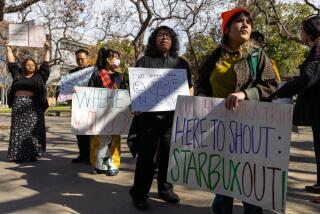Islanders See Grounds for Concern in Local Starbucks
- Share via
BAINBRIDGE ISLAND, Wash. — Seattle, the self-proclaimed capital of caffeine, slips into the fog as the green-and-white ferry steams across Puget Sound laden with commuters bound for home.
Java junkies queue up for paper cups of strong Starbucks coffee from the ship’s cafeteria. They know they won’t be able to find the region’s signature brand on the wooded island they call home.
Starbucks, a modern icon of laid-back Northwest mystique, isn’t welcome here. This bucolic enclave thinks the nation’s largest purveyor of coffee is just too big and too citified.
It’s not that islanders don’t indulge the same coffee mania that has hooked the rest of the Pacific Northwest. It’s not that they don’t consider Starbucks, based only a few miles east as the seagull flies, a good corporate citizen.
It’s a symbolic last stand against urban encroachment and the tackiness of strip malls that characterizes many bedroom communities.
“We struggle with how we can legally keep our island from becoming Anyplace, USA,” says Alice Tawresey, who was mayor of the village of Winslow when islanders decided to ban national franchise fast-food joints.
In 1979, McDonald’s became the first--and only--national take-out franchise to set up shop on the island, replacing a home-grown hamburger stand. That so upset the locals that the town passed a law forbidding any more stand-alone formula take-out restaurants.
That ordinance has stymied efforts by Starbucks to get a toehold on the island, a 35-minute ferry ride from Seattle.
Bainbridge, once a sleepy home to truck farms, summer cottages and artists, is waking up--even if folks don’t smell the coffee. Given Seattle’s rampant growth, more and more professionals from the mainland are looking to Bainbridge and other Puget Sound islands.
The ferry system, the country’s largest, runs its biggest boats on the route, selling 6.8 million tickets a year. Over 12,000 commuters pile on board each day. And they drink gallons of Starbucks, chosen by the cafeteria vendor as the brand of choice for coffee drinks. A deckhand calls the ferries “a gigantic floating Starbucks.”
But as the now-trendy island’s population edges upward--nearly 20,000 and rising--old-timers and some newcomers are getting nervous. Housing prices have crept up to the $300,000 range--more for prime waterfront--and islanders worry that growth will change the character of Bainbridge.
That’s where Starbucks and the trappings of name-brand civilization have become an unintentional lightning rod.
With more than 1,500 outlets, Starbucks has an estimated 5 million customers a day and 1997 sales of nearly $1 billion.
“It’s a symbolic thing,” says Robert Brainerd, 48, who runs the island’s carpet-cleaning business but says soaring rents have forced his family to find a place off the island. “There’s certainly nothing wrong with Starbucks or McDonald’s or Safeway, but name-brand businesses represent growth and all the reasons people came here to get away from in the first place.”
Brainerd was interviewed outside Pegasus, a funky coffee shop in an ivy-covered, two-story brick building. Inside, two transplanted Boston architects, Frank Renna, 35, and David Cinamon, 38, enjoy off-brand coffee and banter over how the island can maintain its distinctive character.
Renna says national chain stores typically are motivated by profits more than local sensibilities.
Cinamon abhors the bland sameness of cookie-cutter stores: “It’s just generic and every place loses its unique character.”
“The magic has been lost already,” says Gary Jacobsen, 48, a ferry worker who grew up on the island. “People came here because of the isolation, but once they got their little piece of the pie, they didn’t wany anybody else to come. But it’s too late.”
All may not be lost for Starbucks. The city is studying a possible change in its ordinance to allow a small commercial zone about a mile away from the waterfront of Winslow.
Cheri Libby, spokeswoman for the company, says Starbucks is taking the roadblock in stride. Although she couldn’t think of a similar unwelcome mat being spread out by a community, she said it’s not unusual to need a zoning ordinance change.
More to Read
Sign up for Essential California
The most important California stories and recommendations in your inbox every morning.
You may occasionally receive promotional content from the Los Angeles Times.













